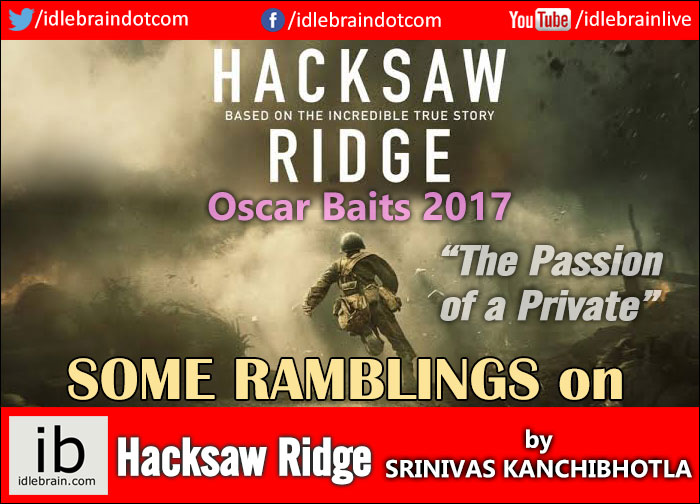
He was against any sort of violence to begin with. The Good Book(s) that led him to develop the spine of his value system clearly enunciated so, in letter, that killing another man, for ANY reason, is morally objectionable. And yet, what he did when his nation took to the battlefield, first, by insisting on helping the war efforts even if it meant not picking up a weapon and charging from the frontlines, but instead ferrying the wounded soldiers out of the harm's way, and second, trying to constantly find his moral beacon amid the fog of war, wasn't simply based on a belief system. It goes much deeper than belief right down to conviction, because beliefs can be shaken up in the face of facts or contradictions, but conviction is rooted in a value, the foundation on which individuality is built. So when Gandhiji took to the battleground in the Boer War during his stint his South Africa as a medical volunteer and assited the same regime that oppressed the natives (winning a civilian medal in the process), or during the height of independence movement, when he proposed again to side with the British government, in stength and spirit, in its wartime exercises during the second world war against the Nazi regime (for which he was soundly and roundly criticized), his arguments were coming not from any tactical or strategic place, but from his core of conviction, that when in distress, a helping hand had to be extended, even if to the enemy. That he took that value to the extreme is a different issue, but the strength of his conviction was such that his moral compass rarely dithered even in the face of such glaring ambuigities. Or take the case of his insistence of his wife cleaning up the latrines, along with him on the Tolstoy Farm, after the laborers on the farm had used the facilities, much to her utter disbelief and disgust. It was not about the disobeying of HIS word that caused him to almost throw his wife out of the house, but her lack of understanding of the spirit behind it that enraged him to no end. That is not belief, that is conviction, the bone-headed rigidness of sticking to an ideal regardless of the consequences.
'Hacksaw Ridge' is a tale of another such tortured soul whose convictions ran contrary to his environment. He was a Seventh day adventist with a strict moral code of not killing his fellow being, because the Lord said so, and not working on the Sabbath day, because the Ten Commandments proclaimed so, and yet, felt just as strongly to enlist in the army and serve his country as a medic during WWII fighting against the Japanese in the pacific. Individuals as these are frustrating, to say the least, and their convictions, reasons and arguments, exasperating, at best. Practicality and pragmatism do not dare drive a wedge in their value system. They are, as even the army psychiatric evaluation in this case proves, are entirely within the spectrum of normalcy and sanity, but for this tick, and hence filed under a more respectable "conscientious objector" category, really, a euphemism for moral dissuader. They are battle hardened in their beliefs, battle ready to fight for their convictions, but when it comes to the actual battle, refuse to pick up a weapon even against an enemey rushing in to plunge the bayonet right into his heart. Applaud for his unwavering conviction or deem him impractical to live in a society full of contradictions, complexities and moral conundrums? To each, his own.
Andrew Garfield brings all the sincerety he can muster to the proceedings, exuding the warmth of his caring and the resolve of his convictions all through his eyes. It is tight rope walk portraying a person out of tune with the rest of the world but still ground him in reality, so that when the situation emerges when his values are going to be tested, his reaction appears organic and not attention-grabbing. For, this is not the role of a Sherlock Holmes or any other mad scientist, he was a real man who lived till not so long ago, ordinary in not every other right, extra-ordinary/eccentric except in that one situation. The first half of the proceedings moves along in a predictable fashion but when the corps reaches the Okinawa island is when Mel Gibson really stretches his directorial limbs mounting the mayhem in a visceral, graphic and sometimes gut-wrenching way. Parallels to the Normany beach invasion in "Saving Private Ryan" become immeidately apprarent, but Gibson's presentation is more stylized, amped up (pumped up) and in the face, as against a more realistic blur that was Speilberg's vision. It is to be expected of Gibson who wrought upon hitherto unseen amount of violence on Christ in "The Passion of the Christ", just to prove that the Lord had to endure such cruelty to prove his love to his children. Similarly he doesn't let up on the hellish vision of war around his lead character to accentuate the chaotic circumstances under which he discharges his duties without losing composure or courage. The post script of the movie proves a fitting end to a man, who was in many ways similar to another kindred soul whom Einstein described thus upon his passing away - “Generations to come will scarce believe that such a one as this ever in flesh and blood walked upon this earth". (about Mahatma Gandhi)
checkout http://kanchib.blogspot.com for Srinivas's Blog.
